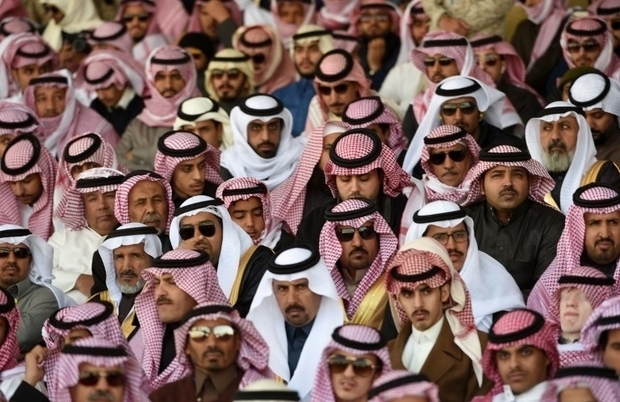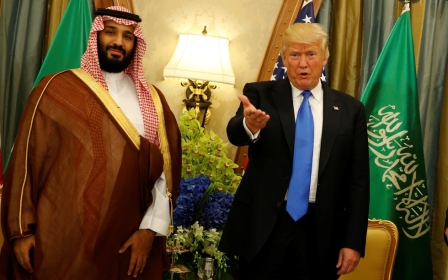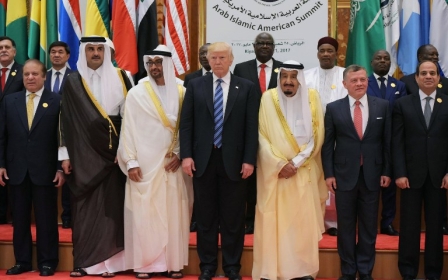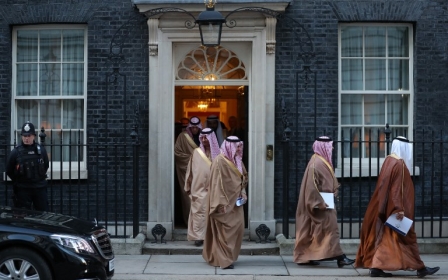The MBS tour will raise the cost of securing US interests in the Middle East
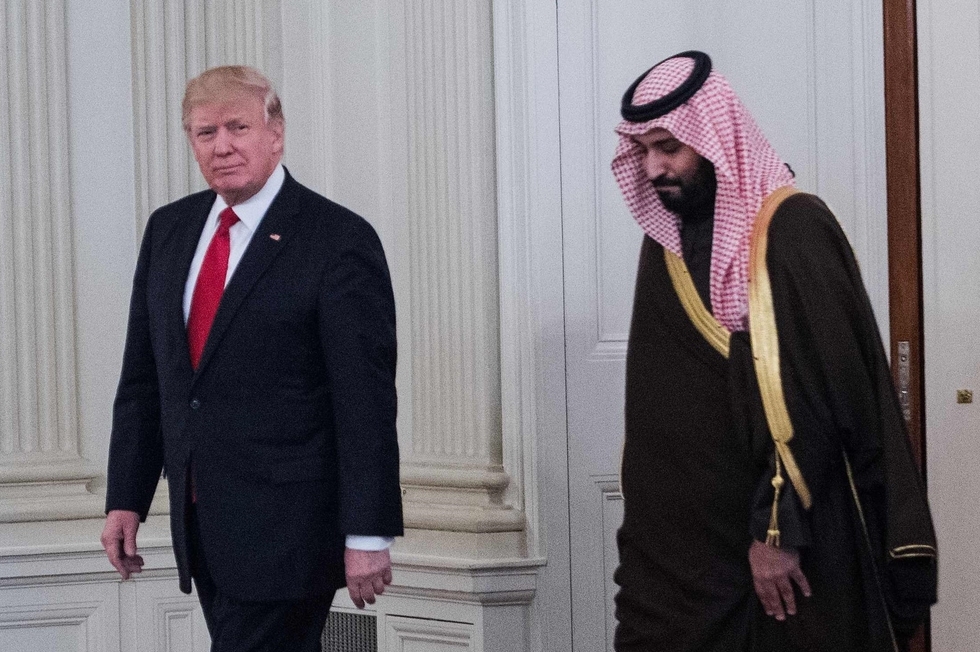
Ever since the kingdom's founder Abdul Aziz ibn Saud dined with US President Franklin D Roosevelt aboard the USS Quincy in 1945, meetings with American presidents have been a rite of passage for Saudi rulers.
That encounter took on a mythic aura and cemented the special relationship between two states whose interests have largely aligned over the past 70 years.
They are set to do so again when Saudi Crown Prince Mohammad bin Salman visits Washington this week and meets with President Donald Trump, presumably to seek the American leader’s continued support for his unorthodox consolidation of power and perilous regional policies.
An alarming moment
Aside from the requisite exchange of pleasantries and photo opportunities, past meetings have nearly always been accompanied by a renewed commitment to empowering Saudi regional hegemony, and in turn, safeguarding American interests in the Middle East.
That arrangement has seen the steady flow of Saudi oil into global markets and a perpetual influx of US military hardware into the kingdom and its neighbouring allies.
But despite decades of repression at home and support for brutal authoritarianism and violent extremism abroad, there has never been as alarming a moment in the history of US support for Saudi Arabia as the current one.
This meeting represents how vast the disparity between authoritarian rulers and their respective populations in the Arab world has become
Both Trump and MBS have enjoyed peculiar paths to power that have seen them rewarded for revelling in their worst impulses. In his determined pursuit of the throne, the young crown prince has upended a delicate internal power structure that has relied on formal and informal distribution of power within the family since his grandfather founded the kingdom.
In the past three years, MBS has aggressively neutralised competing power centres within the state and centralised economic, military, and internal security powers around himself and a small inner circle.
By the time his ailing father King Salman named him as his successor last June, MBS had already launched a destructive war in Yemen with devastating effects on the civilian population, and a blockade of Qatar that further inflamed regional tensions.
Weakening centres of power
In the months since, he has crushed dissent within the kingdom, arresting scores of independent activists, intellectuals, religious scholars, and journalists.
Last November, MBS took things further, engaging in an extrajudicial process waged under the banner of an "anti-corruption" campaign by which he hoped to weaken the remaining centres of power within the ruling family and the country's wealthy elites more broadly.
In the past, the Saudi regime faced considerable constraints on its internal and regional policies by virtue of its alliance with the US, and such a reckless reconfiguring of the state and unchecked aggression toward its neighbours would have been unthinkable.
All of that changed following Trump’s visit to Riyadh last spring, where he was welcomed with a golden golf cart and the chance to ruminate over the region’s future with King Salman in the presence of a glowing orb.
Mohammed bin Salman's celebration in Washington will undoubtedly embolden the region's authoritarian rulers, who have seen unabashed endorsement for many of their worst excesses
That meeting, and the subsequent alignment of interests between MBS and Trump’s son-in-law and trusted advisor Jared Kushner, would only embolden the crown prince. His regional ambitions embroiled Lebanon in a political crisis when MBS seemingly held the country’s prime minister captive in Riyadh and forced his abrupt resignation on live television.
Behind closed doors, MBS reportedly offered his blessing to Trump’s decision to move the US embassy in Israel to Jerusalem, undoing five decades of carefully constructed American policy intended to maintain the appearance of impartiality on the question of Israel’s occupation of Palestinian land.
Collective apprehension
For millions of people observing from across the region, this meeting represents how vast the disparity between authoritarian rulers and their respective populations in the Arab world has become.
Whereas the autocrat historically had to pay lip service to notions of Arab unity, economic justice, and anti-imperialism, MBS has openly flaunted his convergence with the Trump agenda on critical issues that have emerged in the wake of the Arab uprisings and their aftermath.
On the heels of a similar visit by Egyptian President Abdel Fattah al-Sisi last spring, Mohammed bin Salman's celebration in Washington will undoubtedly embolden the region's authoritarian rulers, who have seen unabashed endorsement for many of their worst excesses.
Trump, who has been confronted by suggestions of his own authoritarian impulses at home, has shown little hesitation in endorsing dangerous escalations in Saudi policies toward Iran, Yemen and Qatar, even going as far as to undermine members of his own administration in the process.
While it offers a brutally honest view into the realities of their respective nations' historic role in the region, the brash approach to regional politics adopted by Trump and MBS will no doubt be met with the collective apprehension of the region's most vulnerable populations.
A high cost
Others have taken it upon themselves to suggest quite the opposite. In advance of his upcoming visit to Washington, segments of the establishment media in the US have hailed MBS as a bold reformer who offers a hopeful future not only to his country but to the wider Middle East.
Ignoring the Saudi regime’s untold destruction of Yemen, and with no regard for its role in deepening sectarian violence and supporting brutal dictatorships, the New York Times’ Thomas Friedman has proceeded resolutely in his enduring support for Saudi monarchs as beacons of neoliberal enlightenment and religious moderation.
This comes as little surprise, considering that Friedman represents something of an ideological father figure to the young crown prince. Bin Salman’s announced reforms, including greater state corporatisation, adoption of European educational models, and granting women the right to drive came as the fulfilment of Western expectations of what a moderate Saudi ally should look like.
For Friedman, these proclamations ushered in the "Saudi Arab Spring".
Beaming proudly, he proclaimed that MBS was "more McKinsey than Wahhabi - much more a numbers cruncher than a Quran thumper". What makes these and other recent celebrations of Saudi reform ring so hollow is that they have persisted through more than seven decades of repressive policies by Saudi rulers within the kingdom and across the region.
Indeed, advancing this narrative has done little more than secure US strategic policy objectives in the Middle East, and it is poised to do so yet again, albeit at a much higher cost.
- Abdullah al-Arian is assistant professor of history at Georgetown University, School of Foreign Service in Qatar and author of Answering the Call: Popular Islamic Activism in Sadat's Egypt. You can follow him on Twitter @anhistorian
The views expressed in this article belong to the author and do not necessarily reflect the editorial policy of Middle East Eye.
Photo: US President Donald Trump and then Saudi Deputy Crown Prince and Defense Minister Mohammed bin Salman enter the State Dining Room before lunch at the White House in Washington, DC, on 14 March 2017 (AFP)
New MEE newsletter: Jerusalem Dispatch
Sign up to get the latest insights and analysis on Israel-Palestine, alongside Turkey Unpacked and other MEE newsletters
Middle East Eye delivers independent and unrivalled coverage and analysis of the Middle East, North Africa and beyond. To learn more about republishing this content and the associated fees, please fill out this form. More about MEE can be found here.



